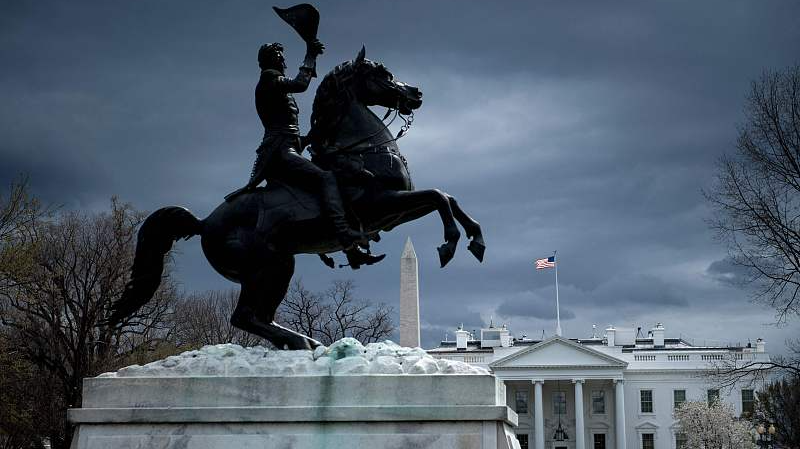
A view of the White House in Washington, D.C., March 30, 2018. /CFP
A view of the White House in Washington, D.C., March 30, 2018. /CFP
Editor's note: Hannan Hussain is a foreign affairs commentator and author. He is a Fulbright recipient at the University of Maryland, the U.S., and a former assistant researcher at Islamabad Policy Research Institute. The article reflects the author's opinions and not necessarily the views of CGTN.
On August 14, a five-member U.S. Congressional delegation led by Senator Ed Markey made an unannounced visit to Taiwan, setting the latest example of flagrant U.S. interference in China's internal affairs. From building unauthorized trade linkages and investment links with China's Taiwan region to frivolously underestimating China's resolute defense of its sovereign territory, Washington's persistent interference lays bare the fallacy that it does not support Taiwan independence forces.
"In Taiwan, Senator Markey and members of the delegation will reaffirm the United States' support for Taiwan," read a statement from the office of Markey.
Any attempts to pursue so-called security, peacemaking and investment links with China's Taiwan will only reinforce the inevitability of China's reunification process. It will further expose Washington to the risks of geopolitical escalation and increase the likelihood of fitting countermeasures from Beijing. Just look at the penalties slapped by Beijing in the wake of House Speaker Pelosi's Taiwan visit. They sent a chill through some quarters of the U.S. strategic community, forcing Washington to prove its tightrope act between cooperation and needless confrontation.
Above all, such blatant acts of the U.S. interference over Taiwan have only strengthened the global consensus on the ironclad principle: more than 100 countries have reaffirmed their commitment to the one-China principle. Thus, a sustained push to deviate from that consensus will only work against America's interests.
In the process of appealing to China hawks, Markey's office touted what is a wrongful and baseless reaffirmation of U.S. "support for Taiwan as guided by the Taiwan Relations Act." Blatant attempts to challenge the one-China principle, and then appeal to the "U.S.-China Joint Communiques and the Six Assurances" in defense of those violations, also proves China's point on an increasingly diluted U.S. policy over the region.

The People's Liberation Army (PLA) organized troops to conduct an unprecedented real-combat joint exercise training in waters and airspace around Taiwan island, August 4, 2022. /CFP
The People's Liberation Army (PLA) organized troops to conduct an unprecedented real-combat joint exercise training in waters and airspace around Taiwan island, August 4, 2022. /CFP
Make no mistake: the idea of the U.S. policy of the one-China principle being consistent across administrations remains a complete farce. Recent administrations have sought to play-up the myth that Washington only ever acknowledged China's position on the Taiwan question, and spared its endorsement. That narrative can't stand a day's scrutiny because the Taiwan question has always involved zero room for maneuverability, and has been the principal foundation of China-U.S. relations for decades.
Fast forward, the visiting U.S. delegation's push to discuss so-called "shared interests" – all under the garb of reducing tensions within the Taiwan Strait – has neither basis nor legitimacy. However, the visit is loud and clear on Washington's intent to incite groups inside Taiwan, and sends an unmistakable message that Taiwan's Democratic Progressive Party authorities will receive more severe blows, should they bank on U.S. support to advance secessionist tendencies.
Further on U.S. contributions to escalating tensions along the Strait, if there is one thing that recent weeks have shown, it is that the U.S. is in no position to speak to the interests of the regional or international community on peace. Look no further than ASEAN's own statement on cross-Strait development: Countries spelled out the costs of "miscalculation, serious confrontation, open conflicts" following Pelosi's Taiwan adventurism, a stark contrast to what Campbell justified as an eventful, consistent and not unprecedented visit.
Similarly, countries that earnestly acknowledged the legal authority of UN General Assembly Resolution 2758 on the one-China principle can easily pass Washington's dangerous chorus of anti-China signaling to Taiwan secessionists. There is only a single one-China principle, and either the U.S. commits to it in full or walks down a path of flagrant, increasingly consequential violations.
Reckless conjecture about China leading some campaign to raise "tensions in the Taiwan Strait" by standing up to U.S. interference is utterly self-compromising. Such hollow rhetoric is simply aimed at misleading a world that has grown increasingly vigilant of U.S. territorial overreach.
In sum, the Markey-led delegation to Taiwan is a perfect illustration of U.S. ignorance in action. It confirms Washington's burning desire to court firm consequences of its pro-independence signaling, entirely at the cost of its own credibility.
Out of all the lessons to be learned from House Speaker Pelosi's debacle, Washington chooses defiance – rather than compliance – on the one-China principle. Persistent attempts to dress these contradictions up as a consistent policy misses the point: that the fate of the Taiwan question only ends one way.
(If you want to contribute and have specific expertise, please contact us at opinions@cgtn.com. Follow @thouse_opinions on Twitter to discover the latest commentaries in the CGTN Opinion Section.)

